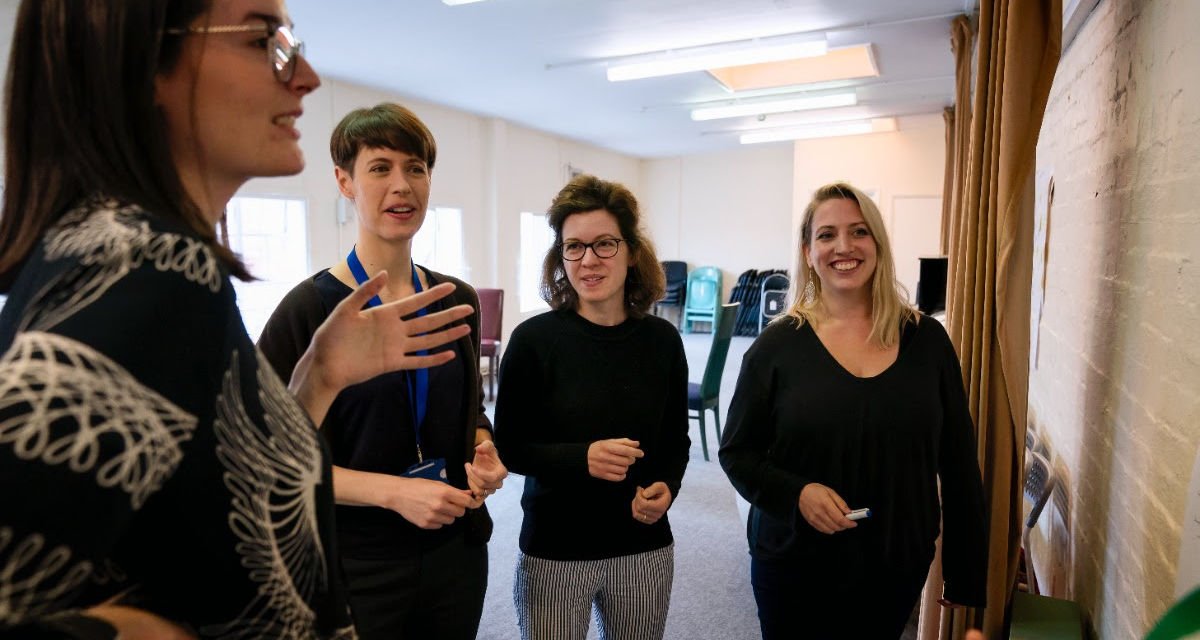Glyndebourne’s Balancing the Score development scheme to support composers from under-represented backgrounds is now open for applications, the Sussex-based opera house has announced.
This is the second iteration of the programme, which first opened for applicants in 2018, launching in 2019. It was originally exclusively open to female composers and the four inaugural participants were Anna Appleby, Ninfea Cruttwell-Reade, Cecilia Livingston and Ailie Robertson.
They spent several years immersing themselves in life at Glyndebourne and developing new work. This culminated in them coming together to compose Pay the Piper, an acclaimed youth opera featuring a cast of professional singers and a chorus of 70 young people from across Sussex; it premiered at Glyndebourne in February 2022.
Balancing the Score has now widened its remit to applications from composers from a range of different backgrounds that are currently under-represented in the world of operatic composition.
Glyndebourne learning and engagement manager Tom Rice-Oxley said of the scheme’s new focus: “As an organisation, Glyndebourne is aware that operatic repertoire being performed on stage often does not reflect the diversity of the UK population, and the expansion of our Balancing the Score scheme is part of the sector’s continuing efforts to address this.”
The programme will offer two composers the chance to spend three years experiencing life at Glyndebourne, attending rehearsals and performances and meeting professional opera makers.
Participants will have commissioning opportunities, access development opportunities with high-profile partners (including Glyndebourne’s resident orchestras, the London Philharmonic Orchestra and Orchestra of the Age of Enlightenment), and receive mentorship from Glyndebourne’s artistic director Stephen Langridge.
Throughout the programme, there will be continued engagement with the young people and local communities, both around Glyndebourne and across tour venues, who take part in Glyndebourne’s Learning and Engagement programme.
Candidates must be based in the UK. They will have a postgraduate degree-level qualification in composition or equivalent professional experience, with a demonstrable interest in learning more about opera, even if they have not yet had significant experience in composing opera.
They will be proactive in seeking out the many informal learning opportunities that come from being onsite at Glyndebourne and tour venues. Some pre-existing engagement with opera, theatre or multimedia work, of writing for the voice, and of practical skills as a pianist and/or vocalist/instrumentalist capable of improvising is desired.
Due to the high level of collaboration work, applicants should also demonstrate their interest in engaging with the community and young people, and give examples of self-generated opportunities outside of a formal learning environment.
This part-time residency will start in February 2023 and last for three years. The successful candidates will receive an annual bursary of £1,000 to cover expenses and time spent at Glyndebourne and will have the opportunity to apply to a Research and Development fund to create works during the residency.
Applications are open now and close on 30 October. The recruitment process involves the submission of a personal statement, CV and portfolio of work, followed by an interview, to take place in November. Successful applicants will be informed in December 2022. Further details on how to submit an application are available on Glyndebourne’s website.
Anna Appleby, one of the composers from the first Balancing the Score intake, said of her experience of the scheme: “It has been an honour to work with Glyndebourne over the past few years on this residency, alongside such talented composer colleagues.
“The memory that will always stay with me is that of the premiere of Pay the Piper, a production that truly was a miracle emerging from the various lockdowns and all of the creative challenges we faced together. It really is a credit to Glyndebourne, its Learning and Engagement team, the Glyndebourne Youth Opera and all artistic staff involved that everything came together so beautifully in the end.”
Image
From left to right: the original Balancing the Score composers Anna Appleby, Cecilia Livingston, Ninfea Cruttwell-Reade and Ailie Robertson (James Bellorini).

